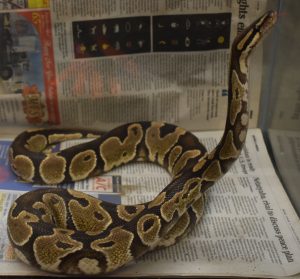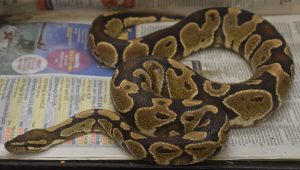Ball Python Turned in After Being Found in Kahaluu
Posted on Jun 1, 2020 in MainNR20-09
June 1, 2020
HONOLULU – A ball python snake was turned in to authorities on Tuesday, May 26th by a resident who said he found the snake while hunting in a forested area in Kahaluu, O`ahu. The resident turned the snake in to the Hawaiian Humane Society, which immediately contacted plant quarantine inspectors at the Hawai`i Department of Agriculture (HDOA). The snake measures approximately four feet in length, weighs about three pounds and is currently being safeguarded at the Plant Quarantine Branch. It is not known how the snake may have arrived in Hawai`i.
Ball pythons are non-venomous and may grow up to six feet in length. They are common in the pet trade on the mainland and are native to Western and West-Central Africa. Ball pythons are constrictors that subdue prey by coiling around and suffocating it. Its diet usually consists of small mammals and birds.
Snakes have no natural predators in Hawai`i and pose a serious threat to Hawai`i’s environment because they compete with native animal populations for food and habitat. Many species, such as the ball python, prey on birds and bird eggs, increasing the threat to our endangered native bird species. Large snakes may also be a threat to the health and safety of humans, pets and other domestic animals.
Snakes are illegal to import and/or possess in Hawai`i. Individuals who have illegal animals are encouraged to turn them in under the amnesty program. The amnesty program allows individuals to voluntary surrender illegal animals and no criminal or civil penalties will be assessed if done before an investigation is initiated. Any illegal animal may be dropped off at any HDOA Office, local Humane Society or at municipal zoos. Animals turned in under amnesty will not be euthanized.
Individuals possessing illegal animals may be charged with a class C felony, issued fines of up to $200,000, and may be sentenced to up to five years in prison. Anyone with information on illegal animals should call the State’s toll-free PEST HOTLINE at 643-PEST (7378).
# # #


